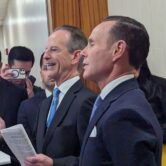SAN JOSE, Calif. (CN) – A federal judge on Tuesday tossed a shareholder derivative suit against Disney’s 11-person board of directors for lack of evidence they knew about a wage-fixing agreement between animation studios.
U.S. District Judge Beth Labson Freeman dismissed the case brought by Disney stockholder Roger Towers, saying he lacked evidence to back up his claims that the entertainment giant’s board members knew about wage-fixing schemes between Disney and other animation studios.
Freeman said Towers relied too heavily on circumstantial evidence, including board members being in the same room with some of the architects of the scheme or that they should’ve known about the scheme.
“An allegation that a defendant should have known of misconduct does not constitute particularized facts of actual knowledge,” Freeman wrote in her 19-page order.
Specifically, Towers relied on board minutes between 2005 and 2006, when Disney supposedly agreed to become part of the wage-fixing scheme, that pointed to knowledge of the scheme by the majority of board members.
But Freeman characterized these minutes as “unremarkable,” finding instead “the board discussed entirely appropriate and lawful means to retain and attract creative talent in relation to an acquisition.”
Towers’ lawsuit is related to the high-profile case Nitsch v. Dreamworks SKG Inc. et al, which claimed Disney and other major animation studios including Pixar, Sony Pictures, Blue Sky and Lucasfilm cemented no-poaching agreements where executives from the companies came to a “handshake agreement” to not cold-call each other’s employees.
All defendants settled the case for $168 million this month, with Disney – which now owns Pixar and Lucasfilm – agreeing to shell out $100 million to a class of animation workers and other studio employees.
The case and settlement mirrored a lawsuit that involved similar agreements between Apple, Adobe, Intuit, Intel and Google, which was also settled.
The principle architect of both schemes was supposedly Steve Jobs, who ran Apple when the tech wage-fixing scheme began and owned Pixar when the animation studios forged a similar agreement.
The U.S. Department of Justice investigated the anti-poaching agreements beginning in 2009, eventually accusing the companies of violating antitrust laws. The companies settled with the government in 2010, but the class actions soon followed – resulting in high-dollar settlements.
Towers brought his shareholder derivative action lawsuit against the Disney board on behalf of the company. In order to prevail, he had to prove a majority of the board members not only know of the anticompetitive labor agreements, but they acted in bad faith in approving them.
Freeman made it clear Towers failed to do this, finding he had instead offered circumstantial evidence rather than particularized facts the board members knew about the schemes.
“Taken as a whole, these allegations are not sufficient to satisfy Delaware law with respect to demand futility, as they do not show that at least six members of the current board face a substantial likelihood of personal liability for violating their fiduciary duties,” Freeman wrote.
The judge dismissed the case with prejudice, effectively ending Towers’ case barring an appeal to the Ninth Circuit.
Subscribe to Closing Arguments
Sign up for new weekly newsletter Closing Arguments to get the latest about ongoing trials, major litigation and hot cases and rulings in courthouses around the U.S. and the world.







